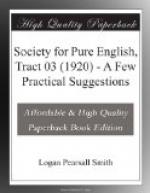are many others which might with advantage be given
a larger currency. This process of dialectal
regeneration, as it is called, has been greatly aided
in the past by men of letters, who have given a literary
standing to the useful and picturesque vocabulary
of their unlettered neighbours, and thus helped to
reinforce with vivid terms our somewhat abstract and
faded standard speech. We owe, for instance,
words like
lilt and
outcome to Carlyle;
croon,
eerie,
gloaming have become
familiar to us from Burns’s poems, and Sir Walter
Scott added a large number of vivid local terms both
to our written and our spoken language. In the
great enrichment of the vocabulary of the romantic
movement by means of words like
murk,
gloaming,
glamour,
gruesome,
eerie,
eldritch,
uncanny,
warlock,
wraith—all
of which were dialect or local words, we find a good
example of the expressive power of dialect speech,
and see how a standard language can be enriched by
the use of popular sources. All members of our
Society can help this process by collecting words from
popular speech which are in their opinion worthy of
a larger currency; they can use them themselves and
call the attention of their friends to them, and if
they are writers, they may be able, like the writers
of the past, to give them a literary standing.
If their suggestions are not accepted, no harm is
done; while, if they make a happy hit and bring to
public notice a popular term or idiom which the language
needs and accepts, they have performed a service to
our speech of no small importance.
L.P.S.
NOTES TO THE ABOVE
Role. The italics and accent may be due
to consciousness of roll. The French word
will never make itself comfortable in English if it
is homophonous with roll.
Timbre. This word is in a peculiar condition.
In the French it has very various significations,
but has come to be adopted in music and acoustics
to connote the quality of a musical sound independent
of its pitch and loudness, a quality derived from
the harmonics which the fundamental note intensifies,
and that depends on the special form of the instrument.
The article Clang in the Oxford Dictionary
quotes Professor Tyndall regretting that we have no
word for this meaning, and suggesting that we should
imitate the awkward German klang-farbe.
We have no word unless we forcibly deprive clangour
of its noisy associations. We generally use timbre
in italics and pronounce it as French; and since the
word is used only by musicians this does not cause
much inconvenience to them, but it is because of its
being an unenglish word that it is confined to specialists:
and truly if it were an English word the quality which
it denotes would be spoken of more frequently, and
perhaps be even more differentiated and recognized,




